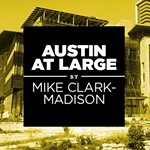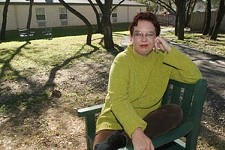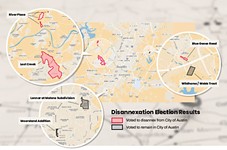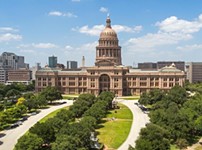"You Can't Stay Here": Austin's Unhoused Population Faces an Uncertain Future
Council, police, and providers confront camp challenge
By Austin Sanders, Fri., May 21, 2021
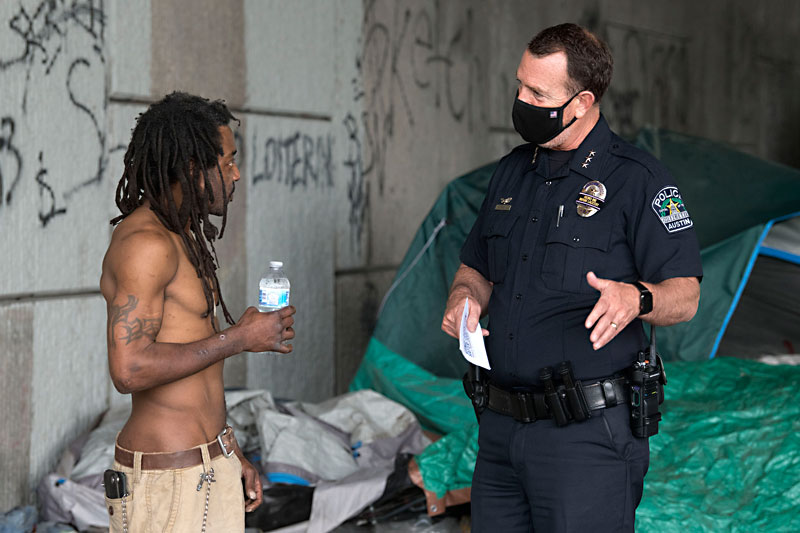
As police and outreach workers took their first steps this week to implement Proposition B's new restrictions on public camping and other aspects of homelessness, one question from unsheltered Austinites remains constant: Where are we supposed to go?
Waiting for a meal at the Sunrise Community Church Homeless Navigation Center in South Austin on Monday, Paul Esquivel voiced his dilemma. "Voters want the police to kick me out of my camp, I get that. But where do they expect me to go?" Esquivel, 57, has lived on the street for five years, the last two at the Menchaca Road underpass on Ben White/U.S. 290 West, just a few blocks from Sunrise. He's contemplating a move to a wooded area, but he views that option as a last resort. Trading the relative security and convenience of living in town near food, jobs, and services for life hidden in the woods is a difficult decision to make.
Nobody can answer Esquivel's question quickly enough. The city's broad strategy of buying hotels to convert into supportive housing has struggled to make headway. Even under optimal conditions, the timeline for housing people in such apartments is measured in months or years. People currently camping in places that are now illegal have less than six weeks to find other places to go, under the city's four-phase plan to implement Prop B. Come July 10, Austin police will be allowed to make arrests to enforce the revived rules restricting public camping, sitting or lying on streets and sidewalks, and panhandling. (Many current campsites are already illegal, but have not been cleared to avoid spreading COVID-19; this may also change in the next few weeks.)
The outreach workers who spend their days helping the unhoused meet their individual needs also don't have a good answer. When a client poses it to Diane Holloway at Sunrise, her response is usually a shrug, as if to say, "I wish I had a better answer." The Austin Police Department officers who began their outreach at campsites this week certainly don't know.
Even members of the Homeless Outreach Street Team – police officers, case workers, and community health paramedics specifically trained to work with people on the street – can't answer it. "It's one of the hardest parts of [HOST's] job," APD Officer Shelly Borton told us Tuesday morning as her colleagues talked to those living under U.S. Highway 183 at Cameron Road in Northeast Austin. "Telling someone you can't stay here, but not having a viable alternative for them either."
Temporary shelters like the Salvation Army are still operating at reduced capacity to lower the risk of spreading COVID. Even at full capacity, Austin does not have nearly enough shelter space to meet demand; on any given night, there are more than 2,200 adults without shelter and fewer than 400 shelter beds for them. (The situation for women, children, and families is somewhat better.) This has been true and widely known for years, but Austin voters – liberal and conservative alike – decided on May 1 that "maintaining clean and safe public spaces," as the euphemism goes, takes precedence. So APD's district representatives must hit the streets with printed booklets filled with information on resources available to Austin's unhoused, much of which they already know, and none of which answers that single question they all have.
One potential solution, presented to City Council on Tuesday with a tremendous thud, could be sanctioned encampments. Although City Manager Spencer Cronk wants to "de-emphasize" such campsites as a solution to unsheltered homelessness, they offer the most feasible alternative to illegal public camping that can be stood up before July 10. APD insists that arrests after that point will be a last resort, and that its "harm-focused approach" to enforcement will limit the negative impact for people forced to relocate. However, the city is already facing pressure from Prop B supporters to begin clearing camps now, which will only be more deafening by midsummer.
City staff revealed a "preliminary list" of 45 city-owned sites Tuesday – including some parkland, some other city facilities, and some properties designated for future affordable housing – that could serve as sanctioned campgrounds. Each would be able to accommodate 50 to 100 people (at a minimum size of 2 acres), and cost from $1.4 million to nearly $2 million annually to operate, assuming a base level of on-site services (food, laundry, etc.). None got any sort of thumbs-up from Council; some are so untenable as to prompt speculation about how seriously staff took the task of identifying these sites, as Council had directed two weeks ago. Staff already, in 2019, recommended against setting up sanctioned sites, which are both more costly than getting people into stable housing and difficult to close once opened.
While continuing to each profess their willingness to have sanctioned sites in all 10 Council districts, members were much more focused at Tuesday's briefing on where not to put them. Council Member Ann Kitchen said Mary Moore Searight Metropolitan Park on Slaughter Lane in her District 5 was "completely inappropriate in several categories," primarily for wildfire risk. CM Leslie Pool said, "I'm committed to trying to find a way to make this work, but the sites that you've designated in [my District 7] ... they just won't work." And CM Pio Renteria told staff, "Don't bother looking" at 1311 Tillery St. in his District 3 – the site of Evergreen Cemetery.
Another facet of "making this work" is accounting for the needs of the people who might use these sites. "I'd go to a campsite if it's up north," Damon Neely, 52, told us. "I'm established up here. I know where I can shower, work, and find food. I know the bus routes, so I would be comfortable up here." Neely, who has lived on the street off-and-on since he was 15, and under U.S. 183 for the past two years, said if the location were inconvenient, he'd just move back into the woods.
Staff has a June 1 deadline to report back with a narrower, and likely more credible, list of sites and cost estimates. Crucially, that report will also address funding sources, including community partnerships, for operating sanctioned camps without diverting resources from solutions that actually end homelessness.
Initial City-Owned Land Options Under Review
City staff released a report on May 18 titled "Sanctioned Encampment Strategy Land Options," including the following list, an "initial analysis of properties owned by the several city departments."
• Walter E. Long Park, 11455 Decker Lake
• John Treviño Park, 9501 FM 969
• Walnut Creek Sports Park, 7800 Johnny Morris
• Given Rec Ctr., 3811 E. 12th
• Fleet Service Yard, 8401 Johnny Morris
• Colony Park land
• 3511 Manor Rd.
• Tannehill Lane
• Onion Creek Metro North
• 7720½ Kellam
• Decommissioned wastewater treatment plant, 5400 E. William Cannon
• FM 812 at FM 973
• Eco-Park at FM 973
• W. Slaughter and 8908-8916-9006 Cullen
• Parque Zaragoza Rec Ctr., 2609 Gonzales
• South Austin Rec Ctr., 1100 Cumberland
• Roy G. Guerrero Park, 400 Grove
• Bolm Road District Park, 6700 Bolm
• Edward Rendon Delgado Pavilion
• 4800-4906 Bolm
• Levander Loop
• 1311 Tillery
• Gus Garcia, 1201 E. Rundberg
• 7211 N. I-35
• 7309 N. I-35
• Mary Moore Searight, 907 W. Slaughter
• Lakeline Neighborhood Park
• 12101 Anderson Mill Rd.
• 10900 FM 2222 (WWT)
• Commons Ford Park, 614 N. Commons Ford
• Walnut Creek/Havens
• Northwest Rec Ctr., 2913 Northland
• Sir Swante Palm Neighborhood Park, E. Third
• Duncan Park, 900 W. Ninth
• San Beach on Cesar Chavez
• Patterson Park, 4200 Brookview
• Bull Creek Park, 6701 Lakewood
• Ryan Drive Warehouse
• Circle C
• Dick Nichols Park, 8011 Beckett
• 11800 FM 1826
• 9513 Circle Dr.
• 4905 Convict Hill
• Norwood Tract
• Austin Recreation Center
Got something to say on the subject? Send a letter to the editor.





